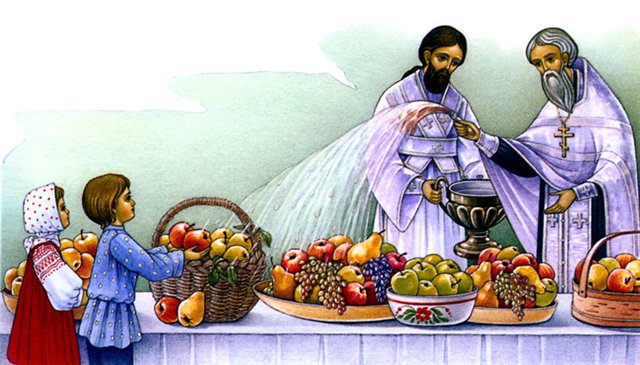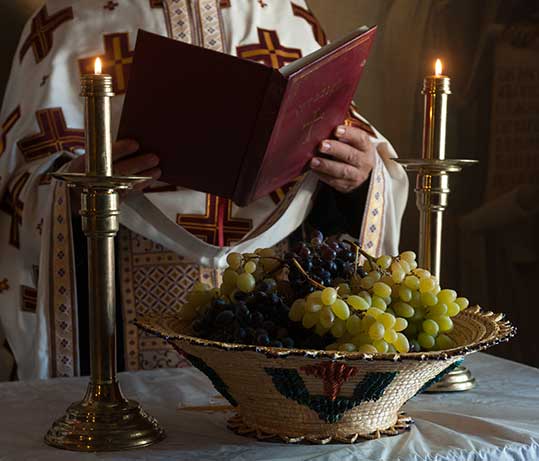Über
die Ordnung und den Zustand der Anfänger und was
sie noch betrifft
Dies
ist die besonnene und gottgefällige Ordnung; wenn einer auf dem Weg
wandert, sehe er weder nach rechts noch nach links, sondern betrachte
immer den Weg, der noch vor ihm liegt. Er sei auch nicht geschwätzig,
sondern spreche nur das Notwendigste, und gebe sich zufrieden mit den
ärmlichsten Gewändern für die Bedürfnisse des Leibes, und mit
minderer Nahrung zur Erhaltung des Leibes, nicht etwa solche, durch
welche die Gefräßigkeit gefördert wird, und dabei eine kleine
Menge von jeder Speise zu sich zu nehmen, und nicht die eine zu
verachten, die andere aber vorzuziehen und seinen Bauch zu füllen;
denn die größte aller Tugenden ist die Unterscheidungsgabe.
Trinke keinen
Wein ohne Gesellschaft, oder wenn kein gesundheitlicher Grund oder
Schwäche vorliegt.
Unterbreche nicht
den Redenden und widerspreche nicht immerzu wie ein Unerzogener,
sonder sei in deinem Verhalten beständig wie ein Weiser.
Wo du dich auch
aufhalten solltest, erachte dich stets als den Bescheidensten und
Diener aller.
Entblöße keines
deiner Glieder jemals vor anderen, und nähere dich niemals dem Leib
eines anderen ohne guten Grund; auch lasse niemanden an deinen Leib
herantreten, es sei denn, wie bereits gesagt, es liegt ein guter
Grund vor.
Fliehe davor, den
Menschen gegenüber freimütig zu sein, wie du vor dem Tod selbst
fliehen würdest.
Erlange eine
bedächtige Ordnung im Schlaf, damit die Kraft Gottes sich nicht von
dir entferne, die dich behütet. Wenn möglich, sollte dich kein
anderer Mensch beim Schlafen beobachten können.
Gebe niemals
deinen Speichel vor anderen von dir ab und solltest du husten wollen,
während der Mahlzeit am Tisch, so wende dein Angesicht nach hinten
und huste. Iss und trink mit Anstand, wie es sich geziemt für die
Kinder Gottes.
Strecke nie deine
Hand unverschämt nach etwas aus, dass vor deinen Gefährten liegt.
Sollte ein
Fremder an deinem Tisch sitzen, versäume nicht, ihn mehrmals zum
essen aufzufordern, nachdem du die Speisen ordentlich, ruhevoll und
nicht mit Hetze auf dem Tisch angerichtet hast. Daraufhin setzte dich
ordentlich und sittsam an den Tisch, immer darauf bedacht, keines der
Körperglieder zu enthüllen.
Wenn du gähnst,
bedecke deinen Mund, und halte kurz den Atemfluss an, um das Gähnen
einzustellen.
Trittst du in die
Zelle (eines Übergeordneten, eines Gefährten, oder eines Schülers),
wache über deine Augen, dass sie die Räumlichkeiten nicht neugierig
betrachten, auch wenn du durch solcherlei Gedanken (der Neugierde)
bedrängt werden solltest, denn wer so schamlos ist, der ist dem
monastischen Ordnung fremd stehend und auch Christus, Der uns diese
Ordnung schenkte. Achte nicht darauf, wo dein Gefährte seine
Habseligkeiten aufbewahrt und öffne und schließe die Türe seiner
Zelle mit Umsicht und Ruhe, wie auch die Türe deiner eigenen Zelle,
und trete zu keiner Zeit unerwartet und plötzlich in fremde
Räumlichkeiten ein.
Dein Gang sollte
nicht hastig sein, es sei denn, eine Pflicht verlangt es von dir.
Sein in jedem guten und gottgefälligen Werk folgsam.
Doch den
Habsüchtigen, Geldgierigen und Weltlichen sei nicht gehorsam, um ein
Teufelswerk zu vermeiden.
Spreche mit allen
mit Sanftmut und betrachte sie mit Besonnenheit, ohne dich am Anblick
ihres Antlitzes sattsehen zu wollen.
Gehe
auf dem Weg den Älteren niemals voran und überholt dich einer
deiner Gefährten, so beschleunige deinen Schritt, um ihn wieder
einzuholen. Wer aber nicht auf diese Weise handelt, ist töricht und
gleicht einem Schwein, das keine Regeln kennt. Wenn dein Gefährte
wiederum auf dem Weg mit jemandem zu sprechen wünscht, warte auf ihn
und dränge ihn nicht zum Weitergang. Immer sollte der Gesunde dem
Kranken zuvorkommen und sagen: „Lass uns einen Halt einlegen, um
uns auszuruhen“.
Rüge niemanden
wegen einer Verfehlung, sondern suche stets in dir selbst den Fehler
und die Schuld.
Vermeide kein
Werk, das du als minderwertig erachtest, und erfülle jede Pflicht
mit Demut.
Solltest du dich
zum Gelächter hinreißen lassen, so zeige dabei wenigstens nicht
deine Zähne.
Solltest du mit
Frauen sprechen müssen, so wende deinen Blick von ihnen ab, um sie
nicht näher zu betrachten. Vor den Nonnen aber fliehe wie vor einer
Falle des Teufels; dazu gehören auch die Zusammenkünfte, die
Gespräche und der Anblick dieser (der Nonnen), damit dein Herz nicht
durch die Unreinheit der Leidenschaften befleckt wird. Selbst
leiblichen Schwestern gegenüber verhalte dich wie ein Fremder.
Hüte dich
ebenfalls vor (engen) Beziehungen zu deinen Nächsten, damit dein
Herz nicht erkalte und die Liebe Gottes nicht verliere.
Gespräche und
Freimütigkeit mit Jüngeren vermeide wie Freundschaft mit dem
Teufel. Zum Gefährten und Miteingeweihten wähle allein den
Menschen, der Gottesfurcht besitzt und über sich zu wachen pflegt,
dessen Zelle ärmlich, aber dessen Erkenntnis der Mysterien Gottes
reichlich ist. Verberge vor allen Menschen deine Geheimnisse,
Handlungen und Kriege.
Vor niemanden
setzte dich ohne Übergewand, sollte keine Not vorliegen.
Verrichte deine
Notdurft mit Besonnenheit und Ehrfurcht vor deinem Schutzengel.
Und lebe in der
Furcht Gottes, bezwinge dich, um bis zu deinem Tod das Geschilderte
zu bewahren, auch wenn dein Herz sich dagegen auflehnt.
Besser wäre es
für dich, todbringendes Gift zu dir zu nehmen, als mit Frauen zu
speisen, handele es sich auch um deine eigene Mutter oder Schwester.
Besser wäre es
für dich, mit Drachen zu hausen, als mit anderen (im selben Raum) zu
schlafen, handele es sich auch um deinen leiblichen Bruder.
Wenn ein Älterer
dich auf dem Weg dazu auffordert, eine Gebetsfolge zu sprechen, sei
nicht unfolgsam; ansonsten solltest du schweigen und in deinem Herzen
den Herrn lobpreisen.
Gerate mit
niemandem wegen einer Sache in Streit und Zerwürfnis, sage niemals
die Unwahrheit und schwäre nicht auf den Namen des Herrn, deines
Gottes.
Sei verachtet
aber verachte niemanden.
Werde betrogen,
aber betrüge selbst niemanden. Besser ist es, Materielles zu
verlieren, als seelischen Schaden zu erleiden; bringe keinen Menschen
vor Gericht, sondern erdulde die Ungerechtigkeit. Beweise Geduld im
Herrn, wenn du zu Unrecht verurteilt wirst.
Erlaube es dir
nicht, weltliche Dinge zu lieben; ordne dich vielmehr Äbten und
Machthabern unter, ohne (engeren) Umgang mit ihnen zu pflegen. Denn
dieser Umgang ist eine teuflische Falle, welche die Nachlässigen
einzufangen und den Verlust ihrer Seele herbeizuführen pflegt.
O Gefräßiger,
weshalb nur wünscht du dir die Befriedigung deines Bauches? Besser
wäre es für dich, glühende Kohlen zu schlucken, als Gebratenes der
Mächtigen und Herrscher dieser Welt.
Beweise allen
Menschen gegenüber, ohne Ausnahme, deine Barmherzigkeit, und sei
stets beherrscht und schamhaft.
Hüte dich vor
Geschwätzigkeit; denn sie tilgt aus dem Herzen die dort von Gottes
Hand eingepflanzten noetischen Regungen.
Fliehe wie vor
einem wilden Löwen vor der genaueren Erforschung der Dogmen der
Kirche, sei es mit Theologen, Außenstehenden oder Andersgläubigen.
Begebe dich nie
in die Zusammenkünfte von zornigen und zanksüchtigen Menschen,
damit dein Herz sich nicht mit Zorn erfülle und deine Seele
eingenommen werden von der Finsternis der Verblendung.
Hause niemals mit
Hochmütigen, damit deiner Seele nicht die Energie des Heiligen
Geistes entzogen werde, und sie nicht zu einer Behausung jeglicher
üblen Leidenschaft werde.
Hältst du dich
an diese Unterweisungen und richtest deine Aufmerksamkeit unentwegt
auf die Betrachtung Gottes, wird das Licht Christi wahrhaftig in
deiner Seele erscheinen und die Finsternis für immer vertreiben.
Christus gebührt
Ehre und Macht, in Ewigkeit. Amen.










